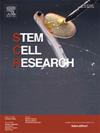从游离硫辛酸贮存障碍(FSASD)患者身上获得的两个 iPSC 株系的生成和特征描述。
IF 0.8
4区 医学
Q4 BIOTECHNOLOGY & APPLIED MICROBIOLOGY
引用次数: 0
摘要
游离硫辛酸贮积症(FSASD)是一种罕见的常染色体隐性神经退行性疾病,由编码溶酶体跨膜硫辛酸排出器 SLC17A5 的 SLC17A5 双重突变引起。SLC17A5 的缺陷会导致溶酶体中游离的硅铝酸和其他酸性六糖的积累。FSASD 的临床表现从轻度(萨拉病)到严重的婴儿型不等。FSASD的病理生物学基础仍然难以捉摸。在这项研究中,我们从一名轻度和一名中度FSASD患者身上获得了两个诱导多能干细胞(iPSC)系,并对其进行了表征,为基础研究和转化研究提供了急需的额外模型。本文章由计算机程序翻译,如有差异,请以英文原文为准。
Generation and characterization of two iPSC lines derived from subjects with Free Sialic Acid Storage Disorder (FSASD)
Free sialic acid storage disorder (FSASD) is a rare, autosomal recessive, neurodegenerative disorder caused by biallelic mutations in SLC17A5, encoding the lysosomal transmembrane sialic acid exporter, SLC17A5. Defects in SLC17A5 lead to lysosomal accumulation of free sialic acid and other acid hexoses. The clinical spectrum of FSASD ranges from mild (Salla disease) to severe infantile forms. The pathobiology underlying FSASD remains elusive. In this study, two induced pluripotent stem cell (iPSC) lines were generated from a mild and an intermediate FSASD patient and characterized to provide much-needed additional models for basic and translational studies.
求助全文
通过发布文献求助,成功后即可免费获取论文全文。
去求助
来源期刊

Stem cell research
生物-生物工程与应用微生物
CiteScore
2.20
自引率
8.30%
发文量
338
审稿时长
55 days
期刊介绍:
Stem Cell Research is dedicated to publishing high-quality manuscripts focusing on the biology and applications of stem cell research. Submissions to Stem Cell Research, may cover all aspects of stem cells, including embryonic stem cells, tissue-specific stem cells, cancer stem cells, developmental studies, stem cell genomes, and translational research. Stem Cell Research publishes 6 issues a year.
 求助内容:
求助内容: 应助结果提醒方式:
应助结果提醒方式:


